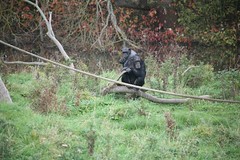Orphan chimps turned killer find Leone refuge
 REGENT, Sierra Leone (Reuters) - They can leap playful somersaults or maul a human to death. Meet the chimpanzee, man's closest relative.
REGENT, Sierra Leone (Reuters) - They can leap playful somersaults or maul a human to death. Meet the chimpanzee, man's closest relative.
Today, Philip, a powerful male, plays tricks to earn a juicy passionfruit. But last year he was among 31 chimps from the Tacugama sanctuary in Sierra Leone which mauled one man to death and attacked four others after escaping from their enclosure.
Most of the runaways, including Philip, were recaptured. But four chimps are still at large in the mist-shrouded forests outside the war-scarred capital Freetown, including the group's huge and aggressive alpha male, Bruno.
For the sanctuary's director Bala Amarasekaran, who started adopting orphaned chimps 20 years ago after rescuing Bruno as a captive baby, the attack was a tragic reminder that chimpanzees are dangerous animals that belong in the wild.
"This problem was created by humans. Every single resident at Tacugama was once living in the wild peacefully with their own kind," said Amarasekaran, whose reserve now houses 85 apes.
"It was humans who killed their families and brought them to town. Sometimes it's sad that we can be at the receiving end as well," he said, estimating that for every chimp saved, 10 more are butchered.
Chimp populations are in steep decline in Sierra Leone, as in much of Africa. Many people adopt cute baby apes after their parents are killed by hunters, without realising the perils.
Chimps are fierce and territorial and their powerful bodies are five times stronger than a man's. Wild chimpanzees will not attack humans because the latter are taller, but domesticated chimps quickly realise their physical advantage.
The orphaned chimps are scarred by years of abuse. For almost all of them, their first experience of mankind was the slaughter of their families. Many were forced to drink alcohol to entertain humans; some had their teeth smashed or were kept in tiny cages. Small wonder they sometimes react violently.
As long as apes are in contact with man, Amarasekaran said he could not promise the April 2006 attack would not be repeated. Earlier this year, Amsterdam zoo suffered a chimpanzee breakout despite its advanced facilities.
"We're in Africa so I'd be a fool to say it will never happen again," Amarasekaran said, stressing last year's incident was the first escape since he founded Tacugama in 1995.
"We're trying to solve this problem by rehabilitating the apes and returning them to the wild."
PASSION FOR PRIMATES
Home to more than 30,000 chimpanzees in the early 1970s, Sierra Leone now harbours less than a tenth of that number, ecologists believe, as man has chopped down almost all the country's original jungles and hunted apes for bushmeat.
One of the four species of great apes, chimpanzees share 99 percent of man's genes and live in structured groups of up to 100 animals. Primatologists have listed 38 chimp vocalisations, from soft grunts and lip smacks to barks, squeals and screams.
Family bonds are strong; mothers suckle their children for three to four years. Chimps are prodigious toolmakers, using rocks to shell nuts and beating hollow trunks to signal their presence to other apes through the thick jungle.
"They are all individuals, they all have different characters so it's never boring with them," said Amarasekaran, who trained as an accountant but describes chimpanzees as his passion. "It would probably happen to anyone who gets close to a chimp. You see your reflection in them and want to help them."
WAR SURVIVORS
Sierra Leone's 1991-2002 civil war nearly destroyed the Tacugama reserve as rebel forces seized areas around Freetown. Workers avoided rebel roadblocks by carrying supplies by night through the forest.
"There was a time when the camp was attacked by rebels and the staff ran into the forests to find a hideout," said Willie Tucker, Tacugama's longest-serving member of staff. At least one chimp died from the trauma of the fighting.
These days, the sanctuary scrapes by on foreign donations, including funds from the U.S. government and the European Union. Amarasekaran tops that up with money from his computer business.
A trickle of visitors, mostly foreign aid workers, supplies around a tenth of revenues. Amarasekaran is optimistic that as Sierra Leone slowly recovers from war, more tourists will come.
Western chimpanzees -- which inhabit the forests of Sierra Leone, Guinea, Ivory Coast and Liberia -- are the second most endangered of the four subspecies, with only an estimated 39,000 in existence. Ranked as the second least-developed nation on earth, Sierra Leone has not made ecology a priority.
However, a law revising the existing 1972 Wildlife Conservation Act has toughened the penalties for capturing and killing chimps. Offenders now face a $1,000 (500 pound) fine or jail.
Many of the rescued chimps came from well-meaning expatriates who wanted to give them homes, but Amarasekaran warns against such behaviour.
Scotsman.com News - Latest News - International - Orphan chimps turned killer find Leone refuge

